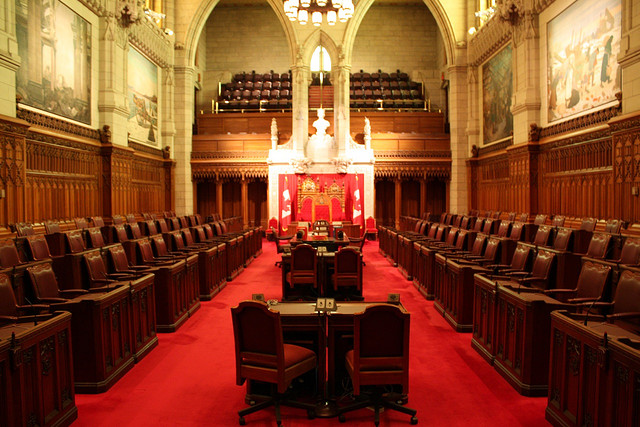There is one, and only one, good thing about the attack on the right of workers to unionize known as Bill C-525. It only applies to a minority of workers in Canada, those who are federally regulated.
The vast majority of Canadian workers fall under provincial labour rules.
Bill C-525, a private member’s bill proposed by Conservative Blaine Calkins, just passed its final vote in the Senate, despite legal issues with its wording that worry some members of the Upper House.
This bill is yet another example of the Harper government using the private member route to push through highly contested and blatantly ideological legislation.
It is a stealth tactic and a way of avoiding full public scrutiny, because private members’ bills do not get the same degree of debate and consideration as do government bills.
Seems fair, but tilts the playing field
The stated purpose of C-525, which Calkins has deceptively dubbed the “Employee Voting Rights Act,” is to assure that when a group of workers vote to join a union there is true majority support and no coercion.
The actual impact will be to place unfair barriers in the way of workers who wish to unionize and then stay in their union.
The current voting system for union certification is known as “card check.” The union certification process is triggered when a majority of workers in a workplace sign union cards.
Calkins’ Bill requires a big additional step: a secret ballot vote.
That idea might sound innocuous and reasonable enough, on the face of it — until you consider that it will be the federal government that supervises such secret ballot votes, when, in many cases, the federal government is itself the employer.
It is impossible to imagine a truly fair and neutral certification process when the employer is both an interested party and the referee. It was Prime Minister Harper’s own Minister for Democratic Reform, Pierre Poilievre, who once said, in quite another context, that the referee should not be wearing a “team jersey.”
But Calkins goes further. As it stands now, to trigger decertification of a union there must be a card check type vote with a minimum of 50 per cent in favour. Bill C-525 would lower that threshold to 40 per cent.
And so, the Harper government has now made it harder for workers under its jurisdiction to unionize and easier for those who want to get rid of unions to do so.
Bill C-377 imposes onerous reporting burdens on unions
This is not the first Harper government attack on unions.
Bill C-377, another odious piece of private member’s business, which its presenter, Conservative MP Russ Hiebert, characterizes as “an act to amend the income tax act,” has had a long and tortured history, but is now approaching final consideration in the Senate.
This bill, like Bill C-525, pretends to be an innocent exercise in transparency.
In fact, it imposes onerous and very costly reporting requirements on unions. Bill C-377’s proposed burdens on unions — which, we should remember, are democratic, voluntary organizations — are far more onerous than any imposed on private businesses or on the public service and crown corporations.
Bill C-377 not only requires disclosure of all union staff salaries over $100,000, it forces unions to disclose even small payments they make, including health benefit payments and payments to union retirees.
One Conservative had the courage to speak out in dissent
When he was still in the Senate, Conservative Hugh Segal eloquently condemned Hiebert’s Bill.
Bill C-377, Segal told the Senate, “forces upon unions in Canada disclosure levels far lower than the corporations, whether public or private or government employers with whom they might negotiate. This will actually worsen labour relations in Canada, slow economic development, and upend the balance between free collective bargaining, capital investment and return, which are vital to a strong and free mixed-market economy.”
There are not too many Conservatives around Parliament these days who share Segal’s rigorous and enlightened political philosophy.
In his speech to the Senate, Segal cited his many Conservative mentors, who include former Ontario Progressive Conservative Premiers John Robarts and Bill Davis; former federal Tory Prime Minister Brian Mulroney; and the late Peter Lougheed, the long serving Alberta Conservative Premier.
This unnecessarily divisive and unfair bill, Segal told his Upper House colleagues, flies in the face everything those pillars of Canadian Conservatism stood for.
The Conservative tradition of which Segal calls himself a proud part “is not about the protection of class or the oppression of labour by capital or capital by labour; it is about a freedom tied to mutual respect.”
The former senior Conservative advisor and Senator from Kingston concluded by saying that Bill C-377 “is an expression of statutory contempt for the working men and women in our trade unions and for the trade unions themselves and their right under federal and provincial law to organize.”
The same could be said of its sister legislation, Bill C-525, which is now about to become the law of the land.
Bill C-377 has passed the House and has been referred to the Senate Committee on Legal and Constitutional Affairs, which will hear witnesses in the New Year.
Photo: flickr/The Canadian Senate



